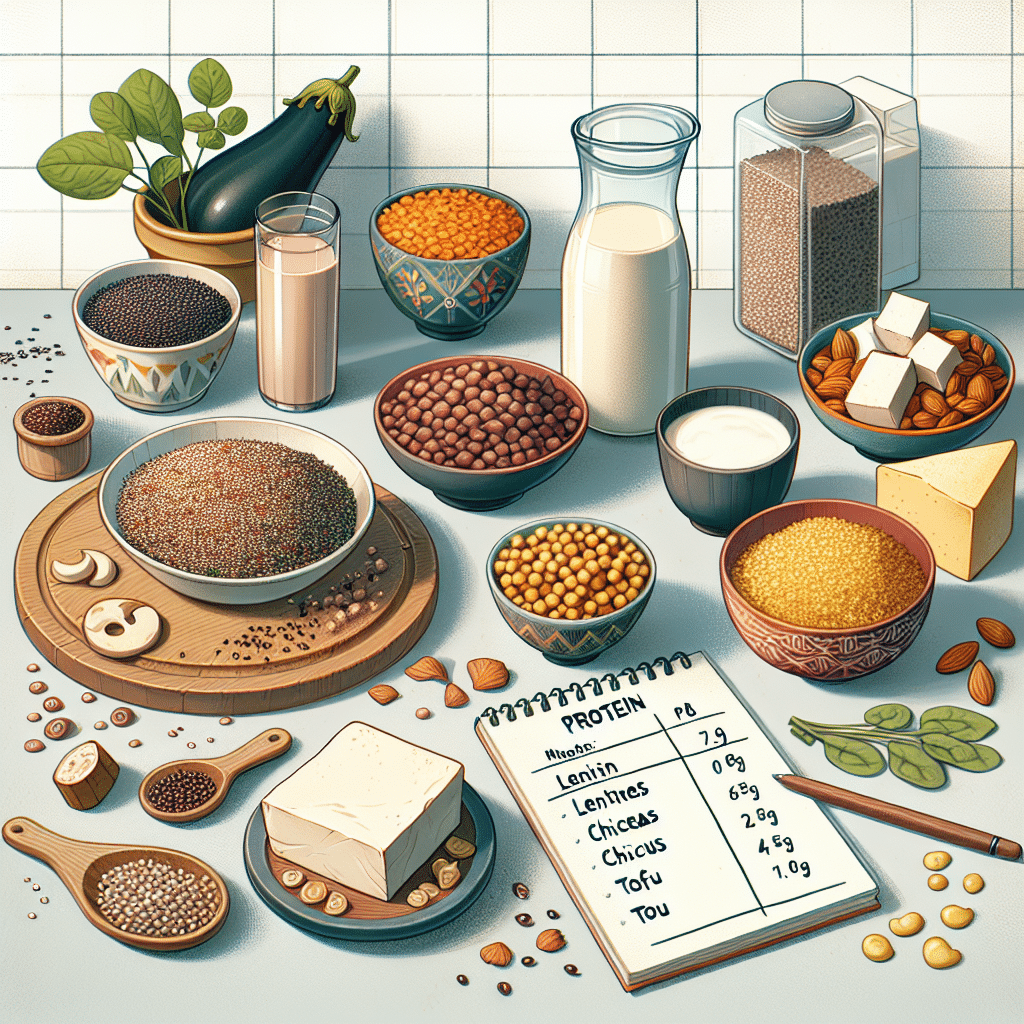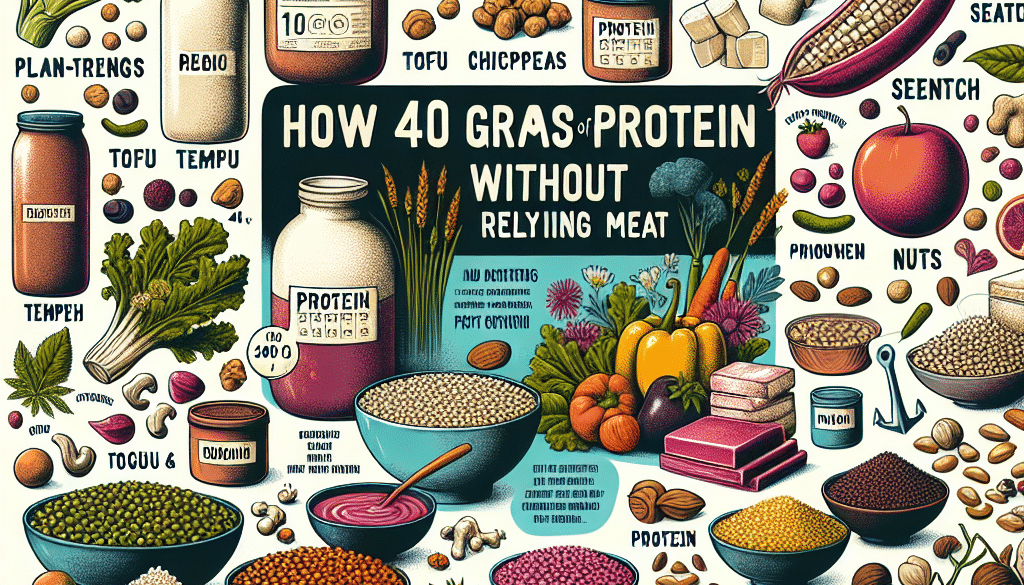How To Get 40 Grams Of Protein Without Meat? The answer
Table of Contents
- 40 Grams of Protein Without Meat: A Comprehensive Guide
- Understanding Plant-Based Proteins
- Legumes: A Protein Powerhouse
- Grains: More Than Just Carbs
- Nuts and Seeds: Nutrient-Dense Protein Snacks
- Dairy and Egg Alternatives
- Protein-Rich Vegetables
- Combining Foods for Complete Protein
- Sample High-Protein Plant-Based Meal Plan
- Conclusion: Diverse Sources for Your Protein Needs
- ETprotein: Your Partner in Plant-Based Protein
40 Grams of Protein Without Meat: A Comprehensive Guide

Protein is a crucial macronutrient that plays a vital role in building and repairing tissues, making enzymes and hormones, and providing energy. Traditionally, meat has been the go-to source for protein, but with growing health, environmental, and ethical concerns, many people are seeking alternative sources. This article explores how to get 40 grams of protein without relying on meat, offering a variety of options for vegetarians, vegans, and those looking to diversify their protein intake.
Understanding Plant-Based Proteins
Plant-based proteins come from various sources, including legumes, grains, nuts, seeds, and vegetables. Unlike most animal proteins, plant-based proteins are often incomplete, meaning they lack one or more essential amino acids. However, by consuming a diverse range of plant-based foods, you can ensure a complete amino acid profile throughout the day.
Legumes: A Protein Powerhouse
- Lentils: With about 18 grams of protein per cooked cup, lentils are a fantastic source of protein. They are also rich in fiber, iron, and folate.
- Chickpeas: Offering around 15 grams of protein per cooked cup, chickpeas are versatile and can be used in salads, soups, or as a base for hummus.
- Black Beans: With approximately 15 grams of protein per cooked cup, black beans are not only protein-rich but also provide essential nutrients like potassium and magnesium.
Grains: More Than Just Carbs
- Quinoa: A complete protein, quinoa provides all nine essential amino acids and has about 8 grams of protein per cooked cup.
- Oats: A staple breakfast food, oats contain around 6 grams of protein per half-cup serving of dry oats, along with beneficial fiber and minerals.
- Whole Wheat Pasta: Switching to whole wheat pasta can provide up to 7.5 grams of protein per cooked cup.
Nuts and Seeds: Nutrient-Dense Protein Snacks
- Almonds: With 6 grams of protein per ounce, almonds are a great snack and can also be added to salads or yogurt.
- Chia Seeds: These tiny seeds pack about 5 grams of protein per ounce, along with omega-3 fatty acids and fiber.
- Pumpkin Seeds: Also known as pepitas, pumpkin seeds offer around 7 grams of protein per ounce.
Dairy and Egg Alternatives
- Greek Yogurt: A 6-ounce serving of Greek yogurt can contain up to 17 grams of protein, making it a high-protein dairy option.
- Cottage Cheese: With about 14 grams of protein per half-cup serving, cottage cheese is another excellent dairy source of protein.
- Eggs: For those who include eggs in their diet, one large egg contains about 6 grams of protein.
Protein-Rich Vegetables
- Spinach: This leafy green contains about 5 grams of protein per cooked cup.
- Broccoli: Known for its health benefits, broccoli provides approximately 4 grams of protein per cooked cup.
- Sweet Corn: A cup of cooked sweet corn has about 5 grams of protein.
Combining Foods for Complete Protein
By combining different plant-based foods, you can create meals that provide complete protein. For example, rice and beans together form a complete protein, offering all the essential amino acids your body needs. Similarly, hummus paired with whole wheat pita bread is another combination that results in a complete protein profile.
Sample High-Protein Plant-Based Meal Plan
To help you reach the 40-gram protein goal without meat, here’s a sample meal plan:
- Breakfast: Oatmeal with almond butter and chia seeds (approx. 15 grams of protein)
- Lunch: Quinoa salad with chickpeas, spinach, and pumpkin seeds (approx. 20 grams of protein)
- Snack: Greek yogurt or a handful of almonds (approx. 6-17 grams of protein)
By carefully planning your meals and snacks, you can easily meet your protein requirements without consuming meat.
Conclusion: Diverse Sources for Your Protein Needs
Getting 40 grams of protein without meat is not only possible but can also be delicious and nutritious. By incorporating a variety of plant-based proteins into your diet, you can enjoy the health benefits of a diverse range of nutrients while meeting your protein needs. Remember to combine different plant-based foods to ensure a complete amino acid profile and consider supplementing with high-quality protein powders if necessary.
ETprotein: Your Partner in Plant-Based Protein
If you’re looking for high-quality plant-based protein supplements, ETprotein offers a range of organic vegan proteins that can help you meet your daily protein goals. Their products, including organic rice protein, pea protein, and various seed proteins, are non-GMO, allergen-free, and feature a neutral taste, making them an excellent addition to any diet.
Whether you’re a manufacturer looking to create protein-rich products or an individual seeking to supplement your diet, ETprotein’s offerings can provide the protein boost you need. With their commitment to quality and customer satisfaction, ETprotein is a reliable choice for all your protein needs.
About ETprotein: ETprotein, a reputable protein and L-(+)-Ergothioneine (EGT) Chinese factory manufacturer and supplier, is renowned for producing, stocking, exporting, and delivering the highest quality organic bulk vegan proteins and L-(+)-Ergothioneine. They include Organic rice protein, clear rice protein, pea protein, clear pea protein, watermelon seed protein, pumpkin seed protein, sunflower seed protein, mung bean protein, peanut protein, and L-(+)-Ergothioneine EGT Pharmaceutical grade, L-(+)-Ergothioneine EGT food grade, L-(+)-Ergothioneine EGT cosmetic grade, L-(+)-Ergothioneine EGT reference grade and L-(+)-Ergothioneine EGT standard. Their offerings, characterized by a neutral taste, non-GMO, allergen-free attributes, with L-(+)-Ergothioneine purity over 98%, 99%, cater to a diverse range of industries. They serve nutraceutical, pharmaceutical, cosmeceutical, veterinary, as well as food and beverage finished product distributors, traders, and manufacturers across Europe, USA, Canada, Australia, Thailand, Japan, Korea, Brazil, and Chile, among others. ETprotein specialization includes exporting and delivering tailor-made protein powder and finished nutritional supplements. Their extensive product range covers sectors like Food and Beverage, Sports Nutrition, Weight Management, Dietary Supplements, Health and Wellness Products, and Infant Formula, ensuring comprehensive solutions to meet all your protein needs. As a trusted company by leading global food and beverage brands and Fortune 500 companies, ETprotein reinforces China’s reputation in the global arena. For more information or to sample their products, please contact them and email sales(at)ETprotein.com today.












